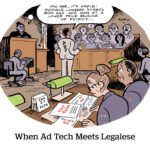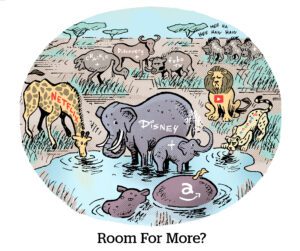Dotdash Meredith (DDM) sees its OpenAI partnership as an opportunity to participate in an inevitable trend.
When it comes to collaborating with generative AI companies, “some [publishers] may go through various stages of resisting that,” said IAC CEO Joey Levin. “But I do expect that others will follow over time.”
Levin probably didn’t intend to invoke Star Trek’s “Resistance is futile” approach to dealing with the Borg’s robot hive mind, but hey.
The publisher announced its partnership with ChatGPT provider OpenAI on Tuesday, the same day as its Q1 earnings release. And it previewed plans for how the partnership could enhance its digital ad business, which grew by 19% YOY, even further.
DDM will license OpenAI’s content for training its generative AI models. In exchange, ChatGPT will link to DDM’s content when it’s used in the AI’s responses to queries. OpenAI will also help DDM develop new generative AI features for its properties, while DDM will use OpenAI’s tech to enhance its contextual targeting solution, D/Cipher.
Protecting search referrals
According to a Wednesday morning Q&A between DDM’s parent company IAC and investors, it appears DDM is looking to generative AI partnerships to protect its investments in boosting search traffic – an attempt to counter Big Tech’s efforts to siphon traffic away from publishers.
In fact, partnering with AI firms might be one of the only viable ways for digital publishers to maintain some degree of referral traffic.
Referrals have been disappearing as search and social platforms seek to keep users engaged on their own properties rather than linking to third-party sites. And they are increasingly relying on generative AI tech to do so.
For example, fears abound about Google’s Search Generative Experience (SGE), which produces article-length responses directly within its AI-generated results without always linking to the third-party sites that information is sourced from. An investor asked Levin whether IAC’s publisher properties are already seeing a reduction in referral traffic as a result of SGE.
“Google is holding more traffic for themselves. That’s been a multiyear, if not decade trend, and I expect that to continue,” Levin said. “But we have not seen any direct impact of that yet.”
Emphasis on “yet.”
However, through the OpenAI deal, DDM has ensured that ChatGPT, at least, will continue to link to its content in query results. And since the deal is non-exclusive, DDM is free to enter similar deals with other generative AI firms.
Traffic growth
The need to protect referral traffic was illustrated by the impact traffic growth had on DDM’s business in Q1.
DDM’s digital revenue grew 13% YOY to $209 million, driven mainly by growth in advertising, Levin said. Ad revenue grew 19% YOY to $132.9 million, which beat investor expectations.
Levin attributed the growth in ad revenue to an 8% increase in core sessions, which DDM defines as visits to its top owned and operated sites.
However, DDM’s core session growth actually slowed down a bit compared to Q4’s 10% rate. This decline resulted from a 50% YOY drop in referrals from Facebook, another platform that’s been investing in AI to keep audiences engaged while limiting outbound links to publishers.
The decline in Facebook referrals “has been a significant trend across the publisher ecosystem since the middle of last year, and it’s hit the whole industry hard,” said IAC EVP, CFO and COO Christopher Halpin. However, Facebook only represents 4% of DDM’s traffic, down from 7% a year ago, he added.
Overall, incremental traffic is hard to come by for US-focused publishers since “the internet is not growing right now in terms of users,” Levin said.
However, DDM has seen more traffic from growing its portfolio of sites, he said. And he hopes DDM content being linked in ChatGPT results will be another source of incremental site visits.
DDM is also bullish on content aggregator Apple News as a source of revenue growth, though its impact is not reflected in DDM’s audience growth numbers since user engagement happens within that app and not on DDM’s sites.
Instead, this impact is reflected in DDM’s licensing revenue, which grew 9% YOY, due mainly to improved performance from content aggregators.
Enhancing contextual
Increased traffic wasn’t DDM’s only source of revenue growth in Q1. Levin said investments in DDM’s ad tech stack also helped it monetize its audience growth.
Those investments include its contextual targeting solution, D/Cipher, which launched last June. DDM anticipates the OpenAI partnership will enhance D/Cipher’s contextual targeting capabilities.
The plan is for the generative AI tech to enable mapping audience intent signals across a wider range of online content, including on non-DDM sites, Levin said.
Basically, the idea is OpenAI’s machine learning capabilities can allow D/Cipher to parse many more sites for data on how the content a person is reading might illustrate what products or services they’re interested in.
OpenAI’s tech can also parse non-text content, including video and images, more effectively than DDM could do on its own, Halpin added.
Essentially, DDM is betting that OpenAI will give it access to contextual signals across more scaled inventory, Levin said. And once third-party cookies are no longer available and advertisers come to prioritize context-based targeting signals, DDM expects to be ahead of the curve.

















